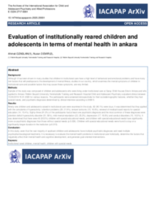Abstract
Background: Although it has been shown in many studies that children in institutional care have a high level of behavioral and emotional problems and have many risk factors that will predispose to the development of mental illness, studies in our country, which examines the mental symptoms of children in institutional care and possible factors that may cause these symptoms, are very limited.
Methods: Sample of the study was composed of children and adolescents who were living under institutional care at Saray Child Houses Site in Ankara and who applied to Ankara Yildirim Beyazit University Yenimahalle Training and Research Hospital Child and Adolescent Psychiatry outpatient clinics between 15.09.2019-15.01.2020 for various reasons. The participants were screened retrospectively for their sociodemographic features, whether they had special needs, and psychiatric diagnoses determined by clinical interview according to DSM 5.
Results: Ninety-one children and adolescents raised in institutional care were examined in the study, 82 (90.1%) were boys. It was determined that they applied with the complaints of hyperactivity / attention problems (29, 31.9%), temper tantrums (15, 16.6%), renewal of medical board reports for special education (14, 15.4%). Eighty-three (91.2%) of the participants had at least one psychiatric diagnosis and the most common of these diagnoses were attention deficit hyperactivity disorder (51, 56%), mild mental retardation (23, 25.2%), depression (17, 18.6%) and conduct disorders (15, 16.5%). It was determined that there were 46 (50.5%) children with special educational needs, and children with special educational needs have significantly more co-psychiatric diagnoses than those without special needs (p:0.038). Children with special educational needs were found to stay on a significantly longer duration in the institution (p:0.015).
Conclusion: In this study, seen that the vast majority of applicant children and adolescents have multiple psychiatric diagnoses and need multiple psychopharmacological treatments. It is necessary to evaluate the mental health problems in institutional care holistically, determine the factors that negatively affect their mental health and cognitive development, and generate goal oriented interventions.

